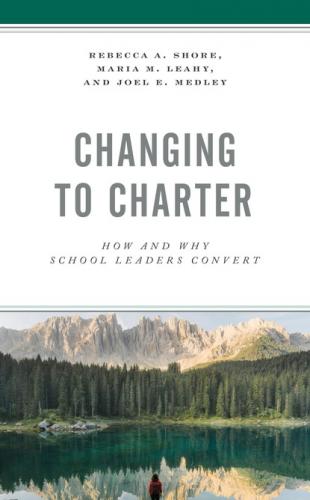Changing to Charter
Changing to Charter
How and Why School
Leaders Convert
Rebecca A. Shore, Maria M. Leahy,
and Joel E. Medley
ROWMAN & LITTLEFIELD
Lanham • Boulder • New York • London
Published by Rowman & Littlefield
A wholly owned subsidiary of The Rowman & Littlefield Publishing Group, Inc.
4501 Forbes Boulevard, Suite 200, Lanham, Maryland 20706
6 Tinworth Street, London SE11 5AL, United Kingdom
Copyright © 2020 by Rebecca A. Shore, Maria M. Leahy, Joel E. Medley
All rights reserved. No part of this book may be reproduced in any form or by any electronic or mechanical means, including information storage and retrieval systems, without written permission from the publisher, except by a reviewer who may quote passages in a review.
British Library Cataloguing in Publication Information Available
Library of Congress Control Number: 2020940706
ISBN: 978-1-4758-5756-6 (cloth : alk. paper)
ISBN: 978-1-4758-5757-3 (pbk. : alk. paper)
ISBN: 978-1-4758-5758-0 (electronic)
To All Leaders and Learners,
Especially,
Lily, Bobby, and Lily’s Bobby,
Alessondra, Lucia, Josie, Ella Mae, and Mila Kate,
Brandt, Campbell, Braxton, and Dawson.
Contents
PART I: Nuts and Bolts of Changing to Charter
PART II: Journeys of Adventurous Leaders
3 New Kids on the Block: Vaughn Next Century Learning Center, 2004
4 New Leaders on the BlockVaughn Next Century Learning Center, 2019
5 Clawing Your Way
6 Success Is a Journey, Not a Destination
7 A District School: Feaster-Edison Charter School
8 Strengthening Unlikely Partnerships: A School District, a District Charter, and Their Community
9 Shared Pain: The Story of Orange Grove Elementary
10 A 100-Year Love Story
11 What If?: A History of the Learning Center! Charter School
12 An Island Story
13 Legacy of Leadership: The Key to Conversion
About the Authors
As I enter my fortieth year in the education profession I can scarcely contain my gratitude to each and every student and professional whose journey my path has crossed; Leaders, learners, readers, writers, they all, as I, have been driven by a quest to improve learning for all, and I am thankful to share this great adventure of life with so many other truth seekers. The joy of a long career in the education field cannot be matched, and I am thankful for the choice my loving and always supportive parents allowed me to make in becoming a teacher. Choice matters for each of us, and charter schools provide educational choices: oftentimes to those who have few others. Special recognition at the moment goes out to those courageous trailblazers who have started charter schools or changed to charter, particularly those who shared their incredible stories with us to make this book possible. You took big risks, and they all paid off for children, families, and the field of education. Thank you for changing to charter.
First, my thanks go out to Tom Koerner and Carlie Wall at Roman & Littlefield Publishing who have gently and encouragingly guided and assisted me through the production of five books, all of which were high points as I reflect on my career over time. Their life’s work at R&L is quite literally getting the word(s) out, shining bright lights of intellectual inquiry on a multitude of complex problems to find possible solutions for us in the field. Thank you, Tom and Carlie and all of the folks at R&L, for your generosity of time and talent toward betterment.
Secondly, to my two coauthors on this particular work; both Maria and Joel were absolutely brilliant former students of mine whose questions captured my thinking and catapulted my imagination. Both were (and are) insightful, kind, curious, hard-working, and amazing. We share core values that transcend time and place. I have learned so much from both of them and am grateful for the results of the crisscrossing of our lifelong ties.
To all my colleagues at UNC Charlotte for your support of my work, especially Bob, Claudia, Cathy, Chuang, Dawson, Debra, Florence, Jamie, Jae Hoon, Jillian, Jim(s), Laurie, Lisa(s), Mark, Mickey, Rich, Ryan, Sandra, Stella, Beth, Alan, Ayesha, Walter, Xiaoxia, and all of you from the Department of Educational Leadership and Cato College of Education who engage in meaningful scholarship with optimism, open minds, verve, and a spirit of service! To my inner circle who endure my rants and raves and enrich my life with your friendship and honesty; Tricia, Kathleen, Kim, Robyn (and all of your children and sidekicks). To musical Mara, motivating Lori, awesome Amy, and joyful Jeanette: you know full well I couldn’t get through a single week without you.
Finally, to my own family, all of whom bless me beyond measure, beyond expression through words; Bruce, Wynona, Marcus, Lily, Bobby, Melissa, Jenny (and my extensive extended family); I thank you and love you with my whole heart always.
Rebecca A. Shore
Changing to Charter is the third in a series of books that are the result of two decades of study of successful, sustained charter school leadership in schools across the United States. The first book, Adventures of Charter School Creators: Leading from the Ground Up (2004), examined leadership characteristics of those bold enough to imagine, create, and successfully lead schools within the new (and controversial) educational reform initiative.
Who were those leaders and why and how did they accomplish such success over a decade of school leadership? All chose to embark on their journeys to improve the lives of the underserved and generally poor, and all experienced unusual success over time and thus became our focus of study. Some were school leaders; others had never worked in a school before. We gleaned
